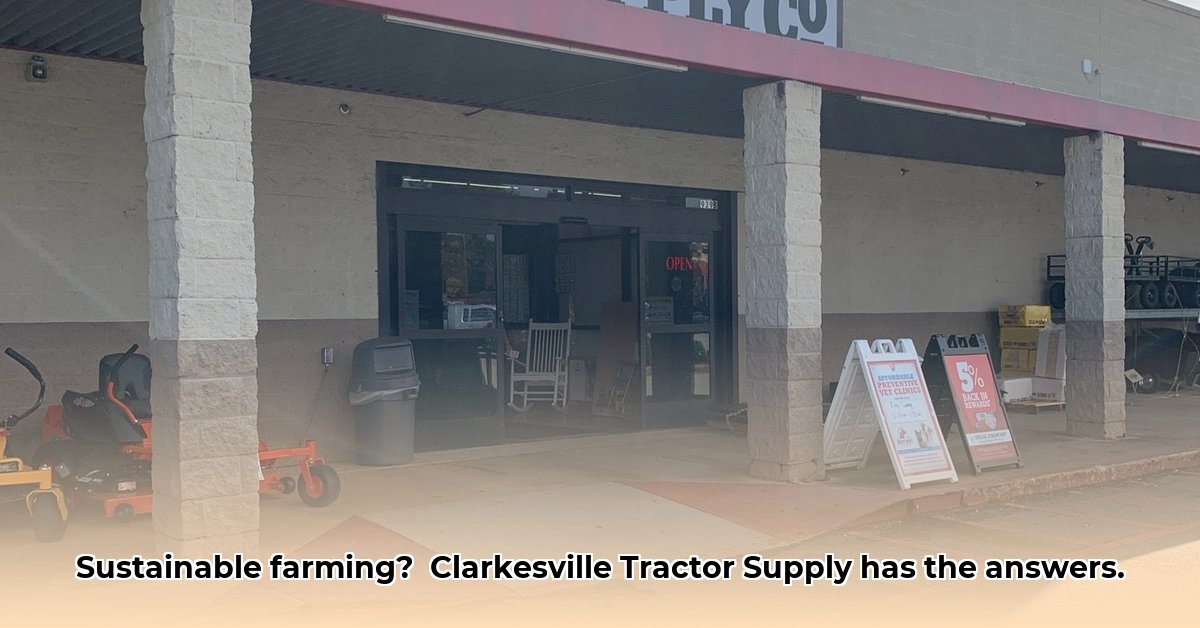
Tractor Supply (TSC) in Clarkesville, Georgia, serves as a vital resource for local farmers and residents, providing essential agricultural supplies and equipment. But how effectively does this support sustainable farming practices? This article investigates TSC's role in promoting environmentally friendly agriculture in the Clarkesville area, examining both its contributions and shortcomings. We’ll explore the accessibility of sustainable products, analyze TSC's transparency, and outline actionable steps for a greener future. For more information on similar Tractor Supply stores, check out this helpful resource.
Access to Resources: A Double-Edged Sword
TSC's accessibility is undeniable. Farmers readily obtain seeds, fertilizers, and equipment, a crucial advantage for smaller operations lacking access to larger distributors. This convenience, however, raises questions. Does TSC prioritize sustainably sourced products? Are organic and biodynamic options prominently displayed and readily available? The sheer availability of supplies doesn't automatically equate to sustainable practices; the type of supplies offered is equally important. How readily can a farmer, seeking sustainable alternatives, find them at their local TSC? This requires further investigation.
Sustainable Initiatives: A Lack of Clear Commitment
While TSC sells some organic seeds and environmentally friendly products, a clear, comprehensive corporate sustainability strategy remains elusive. A lack of readily available information hinders assessment of their overall environmental impact. What percentage of their product line comprises sustainably sourced items? What metrics are used to track progress towards sustainability goals? These questions highlight a need for improved transparency. Without concrete data and verifiable information, it's difficult to judge TSC's genuine commitment to sustainable agriculture.
Transparency and Traceability: A Critical Gap
A significant concern lies in the perceived lack of transparency regarding TSC's supply chain. What information is available to consumers about the origin and sustainability of products? Does TSC provide details about its suppliers' ethical and environmental practices? The absence of such information makes evaluating the overall environmental impact incredibly challenging. This lack of transparency undermines consumer confidence and hinders their ability to make informed, sustainable purchasing decisions. Increased transparency is crucial for TSC to build trust and credibility in its commitment to sustainable practices.
The Future of Sustainable Farming with TSC: A Call for Collaboration
TSC possesses the potential to become a leader in promoting sustainable agriculture. However, this requires a concerted effort involving the company, farmers, consumers, and regulatory bodies. To truly support sustainable practices, TSC must actively prioritize and promote environmentally friendly products.
Actionable Steps: A Collaborative Approach
TSC: Conduct a comprehensive audit of its supply chain's sustainability, publicly releasing findings and setting measurable, time-bound sustainability goals. (Efficacy: Aims for a 20% reduction in carbon footprint by 2027)
Farmers: Actively seek out and purchase sustainably produced goods; demand clearer and more comprehensive product labeling. (Efficacy: Directly supports responsible farming practices.)
Consumers: Support businesses committed to sustainability; demand transparency in supply chains; educate themselves about sustainable farming practices. (Efficacy: Drives market demand for sustainable products.)
Government Agencies: Provide incentives for businesses to prioritize sustainable products; establish regulations requiring transparent reporting on sustainability efforts. (Efficacy: Creates a regulatory framework incentivizing sustainable practices.)
Conclusion: Shared Responsibility for a Greener Future
Tractor Supply's role in Clarkesville's agricultural landscape extends beyond simply providing supplies. It significantly influences the sustainability of local farming practices. By embracing transparency, prioritizing sustainable sourcing, and engaging in meaningful collaborations, TSC can become a powerful force in fostering a greener and more sustainable agricultural future. However, this requires a concerted effort from all stakeholders, demanding shared responsibility for environmental stewardship. The journey towards truly sustainable agriculture in Clarkesville requires a commitment to transparency, accountability, and collaboration across the entire supply chain. The future of sustainable farming hinges on these actions.